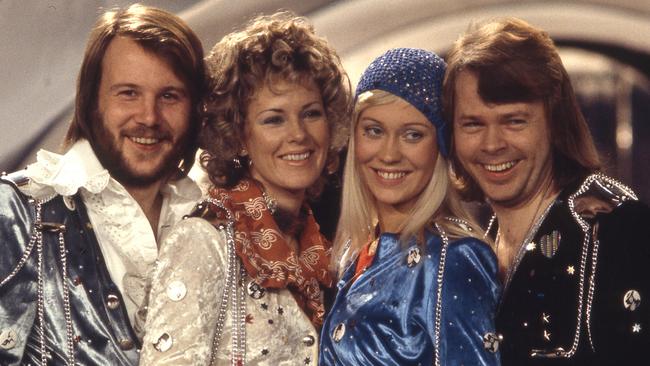How a 42-year-old hit became the voice of a new generation
Why this 42-year-old Abba song is the voice of a new generation.

When picnickers day drinking gave way to an impromptu beach party at Sydney’s Manly on Sunday, video shared from the scene showed possibly tipsy revellers enthusiastically uniting for a chorus not from Spotify’s latest streaming sensation but to ABBA.
It was an energetic a cappella rendition of Gimme! Gimme! Gimme! (A Man After Midnight), which, to be fair, is nothing if not a nod to the isolation and loneliness that were by-products of the lockdown for so many.
Gimme, gimme, gimme a man after midnight
Won’t somebody help me chase the shadows away
It was an odd choice of anthems for a group barely over the threshold of adulthood.
But at TikTok everything old is new again (look what happened to Fleetwood Mac’s Dreams during Lockdown 1.0) and there’s a steady flow of dance videos choreographed to Gimme! on the platform. And an ABBA revival is under way with two new songs, an upcoming album – the first in 40 years – and a virtual live show to accompany all that.
Long ago (but not for all of us; 2005 to be precise) Madonna gave Gimme! a new lease of life with her hit Hung Up (300 million views on YouTube) sampling that high-disco intro – and as it happens right now Generation Z is as besotted with early noughties pop culture as they are with the 1990s. It wasn’t in Benny Andersson and Bjorn Ulvaeus’s plans, but the words to Gimme! correlate with the zeitgeist of the stay-at-home rules of lockdowns.
Half past twelve
And I’m watching the late show in my flat all alone
How I hate to spend the evening on my own
It is all most unlikely. ABBA had six No.1 hit singles in Australia – Gimme! was not one of them.
There’s not a lot wrong with the song, other than its annoyingly simple and repetitive lyrics, a regrettable hallmark of otherwise polished songwriters who had already had hits with Ring, Ring, Honey, Honey, Money, Money, Money, finally outdoing themselves with I Do, I Do, I Do, I Do, I Do. “Of its era” doesn’t do justice to Gimme! Gimme! Gimme! Or ABBA. It was always music that could be tolerated by puritanical fun-haters who wanted their kids indoors after dark, never mind making it to midnight.
Old songs are reinterpreted endlessly, but mostly converted to the sound and style fashions of the day rather than copying the mistakes of previous generations.

But that has been changing as young people reach into their parents’ back catalogues for songs that they embrace like memes (me-mes in ABBA-speak) and faithfully recycle in the footy-crowd style.
It is another of those things for which we can blame East Londoners, along with jellied eels and Jack the Ripper. When gathering to descend to air-raid shelters during London’s Blitz, locals would nonchalantly sing the 1918 novelty song I’m Forever Blowing Bubbles.
Soon it was being sung by West Ham fans and became their eccentric signature. Liverpool fans followed suit when the Kop choir adopted You’ll Never Walk Alone – a then 18-year-old song from the Rodgers and Hammerstein musical Carousel, but a hit in 1963 for local heroes Gerry and the Pacemakers.
No doubt some young sports fans dream of the day they grow up and can sing such dross on the terraces. But you can’t do both. Which is why some of them have picked on the dirge known as Sailing, a hit for Rod Stewart in 1975 (but written by the Sutherland Brothers). At least Millwall fans – the hooligan heavyweights of English sport – have changed the lyrics to an honest “No one like us, no one likes us … we don’t care”.
More recently, Americans have started singing Neil Diamond’s 1969 hit Sweet Caroline after it took off in the Charlotte stands of the National Football League’s Carolina Panthers. That was 1996. It spread to the Boston Red Sox, and Diamond sang it there after the Boston Marathon bombing. It also has been picked up at English stadiums. But why Northern Irish fans sang it at the UEFA Euro in 2016 remain a mystery, even if the Irish are Boston’s largest ethnic group.
When Glasgow Rangers’ fans unofficially adopted the Mental as Anything hit Live It Up and produced their own video, it became a British No.1 hit, 35 years after it had topped out at No.3 in Britain. Of course, they enjoy the schadenfreude of the line “Hey there you with the sad face”, which they sing to their opposition, and it doubtless helped Rangers claim their first premiership in a decade last season.
One thing all those songs – good and bad – have in common is a strong, clear melody. A melody has power. A melody can summon an emotion. It can trigger a reaction in any language and in any musical style. Otherwise how would foreign language songs top the charts?
And what today’s popular songs often lack is a melody, strong or otherwise. Beats can move feet, but melodies move hearts. They are filed away in your brain with colour, feeling, faces, aromas and memories – many of them shared. As we saw at Manly.
Not that we can begrudge them this one thing. For the first time in generations the young have borne much for the sake of the old.
Gimme, gimme, gimme a man after midnight
Take me through the darkness to the break of the day
We can let them claim their dodgy ABBA song.




To join the conversation, please log in. Don't have an account? Register
Join the conversation, you are commenting as Logout